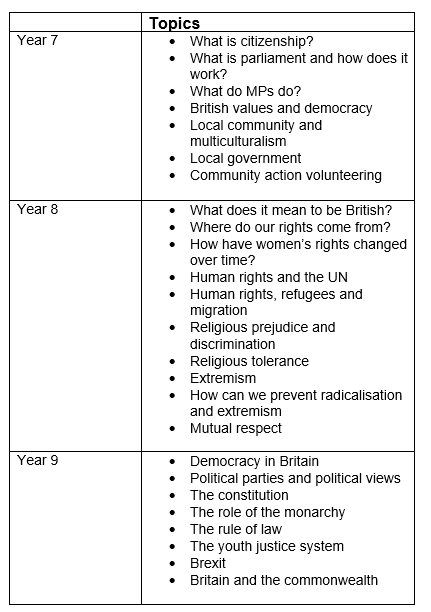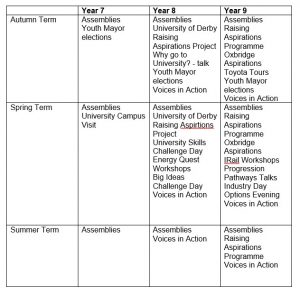Key Stage 3: Citizenship
Curriculum Intent
A high-quality citizenship education helps to provide pupils with knowledge, skills and understanding to prepare them to play a full and active part in society. In particular, citizenship education fosters pupils’ keen awareness and understanding of democracy, government and how laws are made and upheld. Citizenship equips pupils with the skills and knowledge to explore political and social issues critically, to weigh evidence, debate and make reasoned arguments. It should also prepare pupils to take their place in society as responsible citizens, manage their money well and make sound financial decisions.
The Citizenship curriculum is provided as part of PSHE extends pupils beyond the academic, technical or vocational. It supports pupils to develop in many diverse aspects of life. The curriculum teaches pupils how to build their confidence and resilience and to be responsible, respectful and active citizens who are able to play their part and become actively involved in public life as adults. Citizenship develops and deepens the pupils’ understanding of the fundamental British values of democracy, individual liberty, the rule of law and mutual respect and tolerance.
Citizenship promotes equality of opportunity so that all pupils can thrive together, understanding that difference is a positive, not a negative, and that individual characteristics make people unique. It promotes an inclusive environment that meets the needs of all pupils, irrespective of age, disability, gender reassignment, race, religion or belief, sex or sexual orientation. Developing pupils’ character, which we define as a set of positive personal traits, dispositions and virtues informs their motivation and guides their conduct so that they reflect wisely, learn eagerly, behave with integrity and cooperate consistently well with others.
The curriculum develops pupils’ confidence, resilience and knowledge so that they can recognise online and offline risks to their well-being, for example, risks from criminal and sexual exploitation, domestic abuse, forced marriage, substance misuse, gang activity, radicalisation and extremism and making them aware of the support available to them.
The citizenship curriculum supports the School’s provision for pupils’ spiritual, moral, social and cultural education. The curriculum encourages the spiritual development of pupils including developing their ability to be reflective about their own beliefs (religious or otherwise) and perspectives on life, the knowledge of, and respect for, different people’s faiths, feelings and values, a sense of enjoyment and fascination in learning about themselves, others and the world around them and a willingness to reflect on their experiences.
The citizenship curriculum allows for the moral development of pupils including developing their ability to recognise the difference between right and wrong and to readily apply this understanding in their own lives, to recognise legal boundaries and, in doing so, respect the civil and criminal law of England. The pupils understand the consequences of their behaviour and actions. Citizenship develops the pupils’ interest in investigating and offering reasoned views about moral and ethical issues and the ability to understand and appreciate the viewpoints of others on these issues.
The social development of pupils is supported through the curriculum which includes developing their use of a range of social skills in different contexts, for example working and socialising with other pupils, including those from different religious, ethnic and socio-economic backgrounds, a willingness to participate in a variety of communities and social settings, including by volunteering, cooperating well with others and being able to resolve conflicts effectively. The pupils learn about the fundamental British values of democracy, the rule of law, individual liberty and mutual respect and tolerance of those with different faiths and beliefs. They will develop and demonstrate skills and attitudes that will allow them to participate fully in and contribute positively to life in modern Britain.
The curriculum provides provision for the cultural development of pupils including the understanding and appreciation of the wide range of cultural influences that have shaped their own heritage and that of others, understanding and appreciating the range of different cultures in the School and further afield as an essential element of their preparation for life in modern Britain. It provides cultural capital for pupils giving them the ability to recognise and value what we have in common across cultural, religious, ethnic and socio-economic communities, a knowledge of Britain’s democratic parliamentary system and its central role in shaping our history and values and in continuing to develop Britain. Pupils have the opportunity to participate in and respond positively to artistic, musical, sporting and cultural opportunities.
Curriculum overview
Through their study of Citizenship, the pupils:
- acquire a sound knowledge and understanding of how the United Kingdom is governed, its political system and how citizens participate actively in its democratic systems of government
- develop a sound knowledge and understanding of the role of law and the justice system in our society and how laws are shaped and enforced;and,
- develop an interest in, and commitment to, participation in volunteering as well as other forms of responsible activity, that they will take with them into adulthood
Citizenship equips pupils with the skills to think critically and to debate political questions in order to enable them to manage their money on a day-to-day basis and to plan for future financial needs.
Key stage 3
Citizenship should develop pupils’ understanding of democracy, government and the rights and responsibilities of citizens. Pupils should use and apply their knowledge and understanding whilst developing skills to research and interrogate evidence, debate and evaluate viewpoints, present reasoned arguments and take informed action.
Pupils will be taught about:
- the development of the political system of democratic government in the United Kingdom, including the roles of citizens, Parliament and the monarch;
- the operation of Parliament, including voting and elections, and the role of political parties;
- the precious liberties enjoyed by the citizens of the United Kingdom;
- the nature of rules and laws and the justice system, including the role of the police and the operation of courts and tribunals;
- the roles played by public institutions and voluntary groups in society and the ways in which citizens work together to improve their communities, including opportunities to participate in school-based activities; and,
- the functions and uses of money, the importance and practice of budgeting, and managing risk.

Extra-curricular activities
The department also uses drop down days and external visitors to support the programme of study.


